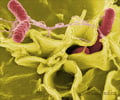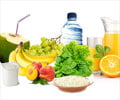Analysing a batch of bacteria brought back by the shuttle Discovery crew last month, scientists could soon develop a vaccine against food poisoning from salmonella bacteria.
Salmonella-induced food poisoning may soon have a vaccine working against it after scientists analysed a batch of bacteria brought back by the shuttle Discovery crew last month.
The researchers conducted a series of experiments aboard the International Space Station, and are now working to develop compounds for a salmonella vaccineWhile previous studies showed that salmonella could become more virulent in weightlessness, further research proved that its virulence could be controlled, toggled on and off like a switch.
Station program scientist Dr. Julie Robinson has revealed that studies in this regard began only because NASA feared that its astronauts could be more susceptible to food poisoning in space due to their weakened immune systems, resulting from microgravity.
Later, the researchers found that microgravity changes salmonella itself, which could provide insight into a new way to possibly control the bacteria on earth.
"Given that salmonella is among the leading causes of food-borne pathogens, one of the disappointments of the 21st century is that we don't have a vaccine," ABC Science quoted Arizona State University's Dr Cheryl Nickerson as saying.
Nickerson heads one of the research teams investigating salmonella in space, which identified genetic changes in space-borne salmonella that made the bacteria more virulent than identical samples on earth.
Advertisement
Last year, a second series of salmonella investigations flew aboard the space station.
Source-ANI
TAN












